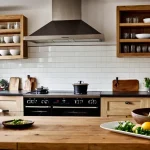Overview of Sustainable Kitchen Countertop Materials in the UK
When selecting sustainable kitchen countertops UK, understanding popular options is essential. Common eco-friendly countertop materials include bamboo, recycled glass, and reclaimed wood. Each offers a unique blend of durability and environmental responsibility, catering to varied kitchen designs.
Bamboo stands out for its rapid renewability, making it one of the most eco-friendly countertop materials available. It grows quickly without needing pesticides, reducing environmental impact. Recycled glass countertops capture the appeal of sustainability by repurposing waste, minimizing landfill contributions while providing striking aesthetics. Reclaimed wood provides character while giving new life to existing resources, cutting down the demand for freshly sourced timber.
Also read : How british traditions shape modern kitchen designs in the uk
Choosing the right sustainable materials for kitchens involves several factors: durability, maintenance, appearance, and carbon footprint. For example, bamboo’s hardness resists scratches, whereas recycled glass requires careful handling to prevent chips. Additionally, assessing manufacturing processes helps identify options with lower emissions and resource use.
The environmental benefits of shifting to sustainable kitchen countertop materials in the UK are substantial. These include reduced waste, conservation of natural resources, and lowered greenhouse gas emissions, empowering homeowners to make greener choices without compromising style or function.
Also read : How are modern uk kitchens evolving to fit compact living spaces?
In-Depth Guide to Top Sustainable Countertop Materials
Sustainable countertop materials are gaining traction as homeowners seek eco-friendly options without sacrificing style or durability. Among the best sustainable countertop materials, recycled glass countertops, bamboo worktops, and reclaimed wood remain standout choices.
Recycled glass countertops UK are composed of crushed glass fragments embedded in a resin or concrete base, offering a unique, modern visual appeal. They are highly durable, resistant to stains and heat, and easy to maintain. Their reflective surfaces enhance natural light, brightening any kitchen space. The environmental benefit comes from diverting glass waste from landfills, making them a top sustainable option.
Reclaimed wood countertops have a compelling story rooted in reuse. Sourced from old barns, factories, or demolished buildings, they bring warmth and character to kitchens with richly varied textures and grains. While they require regular sealing to guard against moisture and scratches, their longevity and timeless look reward proper care. Their sourcing significantly reduces deforestation compared to new wood installation.
Bamboo worktops offer rapid renewability, growing to maturity in just a few years. They are generally more affordable compared to hardwoods and perform well under kitchen conditions due to their hardness and resistance to swelling. Bamboo’s sustainability benefits stem from its fast growth and minimal pesticide needs, making it an ethical countertop material choice for environmentally conscious consumers.
Comparative Pros and Cons of Leading Materials
When choosing eco kitchen worktop materials, understanding the pros and cons of recycled composite countertops versus natural options is vital. Recycled composites offer significant environmental benefits by repurposing waste, aligning well with green kitchen surfaces. They are generally resistant to stains and scratches, requiring less frequent sealing than natural stone, which translates to easier maintenance.
However, recycled composite countertops may not match the unique, authentic look and heat resistance that natural materials like granite or wood provide. Natural kitchen surfaces can develop a patina over time, adding character but also demanding more upkeep, including regular sealing and careful cleaning to avoid damage.
From a lifespan perspective, quality recycled composites are durable, often rivaling natural stone, but minor chips can be harder to repair. Cost effectiveness favors composites initially due to lower installation and maintenance expenses. Natural materials might cost more upfront and in upkeep but can increase property value through their timeless appeal.
Balancing eco kitchen worktop pros and cons involves considering your priorities—whether sustainability, easy maintenance, or classic aesthetics—and evaluating how each material matches your lifestyle and budget over time.
Sourcing and Purchasing: UK Suppliers & Brands
Finding the right eco-friendly kitchen worktop can be straightforward with the right guidance.
When exploring where to buy eco countertops UK, start with suppliers who prioritize sustainability and ethical sourcing. Look for reputable sustainable kitchen worktop suppliers offering certifications such as FSC (Forest Stewardship Council) or Cradle to Cradle, confirming that materials come from responsibly managed sources. These certifications ensure your kitchen worktop reduces environmental harm.
UK eco-friendly kitchen brands vary widely in price, typically influenced by material choice and production methods. For example, worktops made from reclaimed wood may come at a higher price due to labor-intensive processes compared to engineered bamboo alternatives. Understanding what affects cost helps in making an informed purchase.
Leading UK eco-friendly kitchen brands often provide transparent information on sourcing, emphasizing recycled or renewable materials. When evaluating suppliers, ask about their carbon footprint and waste reduction strategies. This approach ensures your sustainable kitchen worktop supports both environmental and social responsibility.
Choosing established suppliers with clear ethical credentials guarantees durability and quality, making your investment in eco countertops both smart and conscientious.
Design Inspiration Featuring Eco-Friendly Kitchen Countertops
Creating a modern eco-friendly kitchen begins with selecting the right eco kitchen countertop ideas that balance style and sustainability. In the UK, homeowners increasingly prefer sustainable kitchen design that reduces environmental impact without compromising elegance. Popular materials include reclaimed wood, bamboo, and recycled glass, all offering unique textures and colors that fit various kitchen styles.
For instance, reclaimed wood countertops bring warmth and history to a contemporary kitchen, complementing sleek white cabinets or industrial fixtures. Bamboo, a rapidly renewable resource, works well in minimalist or Scandinavian-inspired kitchens, offering durability paired with a light, natural look. Recycled glass countertops stand out in modern designs for their vibrant colors and sleek finish, blending eco-consciousness with artistic expression.
Successfully integrating these eco-friendly countertops involves considering overall kitchen aesthetics and functionality. Pairing eco countertops with energy-efficient appliances and non-toxic paints can create a cohesive sustainable kitchen design UK homeowners appreciate. Whether aiming for rustic charm or ultra-modern vibes, selecting the right eco countertop sets the tone for the entire space. Thoughtful design choices prove that sustainability and style can coexist beautifully in a contemporary UK kitchen.

